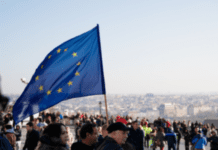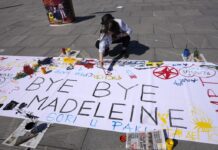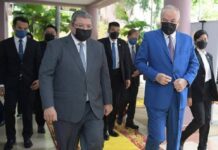Some thoughts on why and how we should think about the future of the...
The task of the institutions and the member-states of the EU is not only to defend liberal democracy against strong external threats but also...
Karijerne diplomate i (ili) oslanjanje na eksterne resurse?
Diplomatija se uvek doživljavala kao elitno zanimanje i ni malo ne čudi to što veliki broj ljudi koji se bave javnim poslovima (ne samo...
Umstrittene Äußerungen von Andrij Melnyk: Was darf Diplomatie?
Paul Widmer, Verfasser des Basiswerks "Diplomatie - Ein Handbuch", vermutet hinter Andrij Melnyks Äußerungen eher "Kalkül, als einen Ausrutscher". Das Verhalten des ukrainischen Botschafters...
Madeleine Albright: America’s Ribbentrop
In May of 1996, Lesley Stahl, of 60 Minutes, asked the future Secretary of State Madeleine Albright about the humanitarian disaster in Iraq, which...
Digital diplomacy can never replace face-face diplomacy – Saifuddin
While it is important to embrace digital diplomacy in the post pandemic period, Malaysian Foreign Minister Datuk Saifuddin Abdullah reminded the diplomatic community to...
Abu Dhabi forum to explore diplomacy in a post-pandemic world
The Anwar Gargash Diplomatic Academy (AGDA) will host the 47th edition of the ‘International Forum on Diplomatic Training (IFDT)’ this week.
The forum, which will...
Novo značajno delo Duška Lopandića o razvoju diplomatije i međunarodnih odnosa
Iz štampe je izašlo vredno i značajno delo ambasadora dr Duška Lopandića „Reči su senke dela – razvoj diplomatije i međunarodnih veza od XV...
Gay U.S. Diplomats Still Battle Discrimination Abroad
HOT TOPIC
Gay U.S. Diplomats Still Battle Discrimination Abroad
Despite recently won rights at home, LGBTI+ members of the Foreign Service are not welcome in 70 countries.
By NICHOLAS KRALEV and LOUIS SAVOIA | JULY 18, 2021
Last month, the U.S. Department of State flew the rainbow flag in front of its main building in Foggy Bottom for the first time. Photo courtesy of the Department of State.
More than a decade ago, Victor (not his real name), a U.S. Foreign Service officer then in his 30s, started a tour in a Middle Eastern country. He wanted to bring along his partner, who wasn’t a U.S. citizen. Even though the U.S. government didn’t officially recognize same-sex relationships, the State Department tolerated them. The bigger problem was the host-country, which refused to grant Victor’s partner a visa. Eventually, the U.S. Embassy found a “workaround”: the only way for the couple to be together was for Victor to hire his partner as a “dome..
Moscow Is Using Memory Diplomacy to Export Its Narrative to the World
The memory of World War II—or the Great Patriotic War, as Russia calls it—occupies a cult-like status in Russian popular and political culture. At...
Can America remain model of democracy around the world?
The Constitution and civic participation in a democracy played an critical role in my career abroad as a public diplomacy foreign service officer for...














